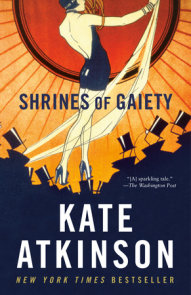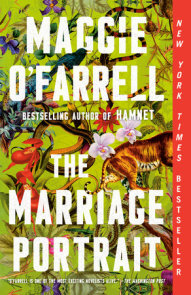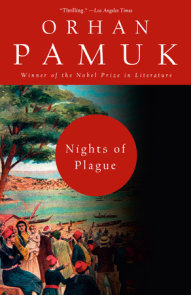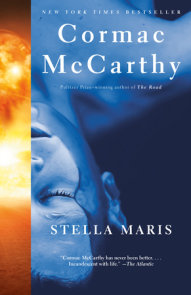READERS GUIDE
The questions, discussion topics, and other material that follow are intended to enhance your group’s conversation of Lessons by Ian McEwan, a bildungsroman that weaves together the ordinary and extraordinary moments of the life of Roland Baines, revealing how inextricable everyday individuals are from the tide of history, as both its causes and effects, its victims and victors.Questions and Topics for Discussion
1. How did your reading experience differ between passages and scenes related to major historical events and those that were more intimate and specific to Roland and the other characters?
2. Roland reflects: “The past, the modern past, was a weight, a burden of piled rubble, forgotten grief. But the weight on him was at one remove. It barely weighed at all. The accidental fortune was beyond calculation, to have been born in 1948 in placid Hampshire, not Ukraine or Poland in 1928, not to have been dragged from the synagogue steps in 1941 and brought here. His white-tiled cell—a piano lesson, a premature love affair, a missed education, a missing wife—was by comparison a luxury suite. If his life so far was a failure, as he often thought, it was in the face of history’s largesse” (page 206). Do you agree with this idea, in particular the “weight” of Roland’s own experience? How do you contemplate your own life experiences in the context of history at large?
3. Discuss the various “lessons” that Roland learns throughout the novel, whether they are explicit or implicit, asked for or imposed upon him. Who of his “teachers” leaves the biggest impression? How does he pass those lessons on to the future generation?
4. Which of the historical time periods that the novel traverses—from post−World War II to Covid—have you directly experienced? How did reading Roland’s experience of them affect your own understanding, or lack thereof, of the events? In what ways do the circumstances of Covid, as explored in the novel, make us question the placement of the present in the fabric of history? Do you make efforts to preserve the present like Roland and others do, through journals, photographs, and other relics of memory?
5. Why does Roland’s introduction of jazz music into his and Miriam’s repertoire change the nature of their relationship? If you’ve heard “’Round Midnight,” how would you describe the nature of the music, and perhaps why it was so threatening to Miriam’s dominance over Roland?
6. Besides Roland’s piano lessons, music helps mark time—cultural and personal moments—throughout the book, creating a kind of soundtrack or refrain. What are some of the groups, songs, and albums that shape Roland’s experience of the world and his own life? What pieces of music stand out in your memory in a similar way?
7. Although Roland pursues work in art—poetry and piano—he’s surround by others, such as Alissa and Miriam, whose investment in art is more complete, even debilitatingly so. What does Roland gain, and what does he lose, by not devoting himself to piano or other formal studies that could have won him more social acclaim? Consider the promise of the review of his performance as a teenager: “Young Roland played his part not only with technical mastery, but with a barely credible emotional maturity and formidable insight. I predict that within ten years the name of Roland Baines will resound in classical circles and beyond. He is simply brilliant” (page 136). Was his “emotional maturity” at the time actually credible?
8. Roland’s romantic experiences with Miriam, Alissa, and Daphne are radically different in terms of how they come about, the dynamic between the partners, and what Roland comes away with when he’s ultimately left alone without his partner. Discuss these differences and how you responded to each relationship, as well as what you thought of how Roland made amends (or did not) with each of the women at the end of the relationship.
9. Is Alissa’s refusal of motherhood a product of her time, a choice reflective of her personality that would have happened in any time period, or both? What about the way Roland responds to her leaving differs from other similar stories you’ve read, where the husband−wife conflict is opposite?
10. Alissa is unperturbed about writing her own life into fiction, in both The Journey and Her Slow Reduction. What responsibility do artists have to their influences? Consider not only Alissa’s story, but also other (real) artists, such as Robert Lowell, mentioned in the novel. How do you as a reader factor into your evaluation whether details of a work of art—a novel or other medium—are based in reality? Did you find yourself asking these questions while reading Lessons?
11. During their final encounter, Miriam asks Roland “to stop seeing it all through the eyes of a child” (page 315). How does Roland’s viewpoint, of Miriam and of other people and events, change from when he is a child and teenager, into his later years? What do other children in the book, such as Lawrence and Stefanie, offer by way of their limited but unique child-perspectives on the world? Consider Roland’s observation from one of his first piano lessons—“He hesitated before yet another of those blinding encounters with the ways of adults. They never told you what they knew. They concealed from you the boundaries of your ignorance. What happened, whatever it was, must be his fault and disobedience was against his nature” (page 4)—as well as Roland’s comment about Gerald’s medical opinion of his chest pain (which turns out to be wrong)—“But Gerald was in pediatrics. Children’s hearts were different” (page 389).
12. Did you agree with Roland’s decision not to persecute Miriam? What is it about the circumstances of time and history that made this option even possible—and how does the label of “abuse” change Roland’s own memory of his experience with her? How does her behavior compare to Alissa’s, in terms of the damage it does to his life and the lessons it affords him?
13. Discuss the standards upheld for men and women in the novel—as humans, as parents, as teachers and students, and as artists. For instance, how would it have been different if Miriam was a man and Roland a young girl; or if Roland had left Alissa to become a great poet and “follow the obscure trail of an exquisite idea that could lead to a lucky narrowing, to a fiery point, a sudden focus of pure light to illuminate a first line that would hold the secret key to the lines that must follow” (page 21)? Did you find yourself siding with one gender, or with certain characters, over others, and how did your opinion of their individual stories align with your broader social views on gender and gender equality?
14. We hear differing, subjective accounts of the virtues and sins, the care and violations, committed by Roland’s and Alissa’s parents, towards their children directly and indirectly. How do Roland and Alissa resolve these tensions personally, and what stories and impressions of their parents are imparted to Lawrence as grandson? How do you think Lawrence will pass down the memory of his parents to his children? Reflect on the dynamics within the generations of your own family, and how time fixes or contorts the memory of certain individuals.
15. How does Peter’s arrival on the scene on the trail, when Roland intends to scatter Daphne’s ashes, alter the significance of that moment in Roland’s overall story? What other moments in the novel similarly derail an expectation of how a memory will be formed? Has anything like this happened to you, and how did you respond?
16. Daphne predicts the pain she’ll feel upon dying will be “big, ‘like a tower’” (page 366). How does what actually happens to her compare to the real towers (and walls, and other physical structures) that fall in the course of the novel? What do we know about their impact from Roland’s suffering in the wake of the collapse?
17. What details about the struggles of past decades—war, “unreliable supplies of labour and materials,” climate change, et cetera—seem to persist throughout time (page 344)? How could you relate to some of the details of Roland’s early experiences in the sixties and seventies, even in modern times?
18. When Roland visits Alissa at her request late in their lives, she asks him, “How was your life?” To which he replies, “Good and bad” (page 411). How does this simple exchange reflect the sum total (or more) of the novel’s events and revelations? How would you answer that question?
Suggested Reading
David Copperfield by Charles DickensThe Days of Abandonment by Elena Ferrante
The Sparsholt Affair by Alan Hollinghurst
My Struggle by Karl Ove Knausgaard
Pachinko by Min Jin Lee
Buddenbrooks by Thomas Mann
Atonement by Ian McEwan
The Overstory by Richard Powers
American Pastoral by Philip Roth
The Last Hundred Years Trilogy by Jane Smiley






















